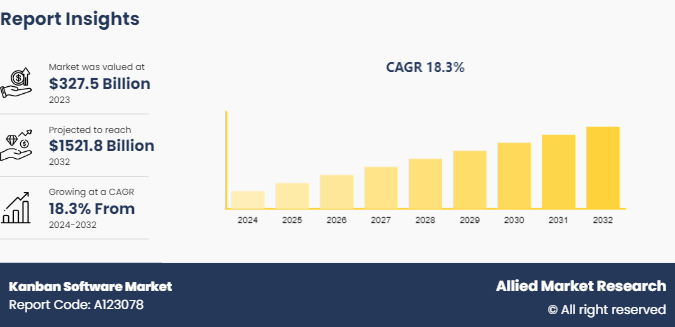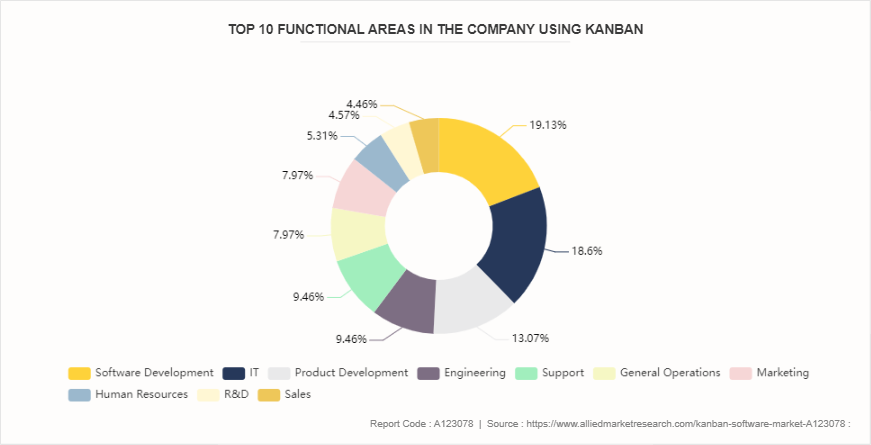Kanban Software Market Research, 2032
The global kanban software market was valued at $327.5 billion in 2023, and is projected to reach $1521.8 billion by 2032, growing at a CAGR of 18.3% from 2024 to 2032. The kanban software market is characterized by innovation and competition, with vendors constantly enhancing their products to offer advanced features such as automation, analytics, and integration with other tools. As businesses increasingly adopt agile methodologies and lean principles, the demand for Kanban software is expected to grow, driving further innovation and expansion in the market.

Market Introduction and Definition
The kanban software market refers to the industry segment that focuses on the development, distribution, and utilization of software tools specifically designed to implement kanban methodologies in various organizational settings. This market includes a range of software solutions that enable businesses to visualize workflows, manage tasks, and optimize processes using kanban boards and cards. Companies offering kanban software cater to diverse industries and sectors, providing customizable solutions to meet the unique needs of different organizations.
Key Takeaways
The kanban software market study covers 20 countries. The research includes a segment analysis of each country in terms of value ($Million) for the projected kanban software market forecast period 2023-2032.
More than 1, 500 product literatures, industry releases, annual reports, and other such documents of major kanban software industry participants along with authentic industry journals, trade associations' releases, and government websites have been reviewed for generating high-value industry insights and kanban software market size
The study integrated high-quality data, professional opinions and analysis, and critical independent perspectives. The research approach is intended to provide a balanced view of global markets and to assist stakeholders in making educated decisions in order to achieve their most ambitious growth objectives.
Key Market Dynamics
Rise in demand for agile project management methodologies in organizations across various industries is driving the market growth. Kanban software offers a flexible and visual approach to managing workflows, enabling teams to prioritize tasks, track progress, and improve efficiency. Also, rise of remote work and distributed teams has fueled the need for collaborative tools like kanban software that facilitate communication and coordination among team members regardless of their physical location. Furthermore, the scalability and adaptability of kanban software make it suitable for businesses of all sizes, from startups to large enterprises, seeking to streamline their processes and enhance productivity. However, resistance to change within organizations that are accustomed to traditional project management methods is hampering the market. Implementing Kanban software requires a shift in mindset and culture, which can be met with resistance from employees who are comfortable with existing practices. Additionally, concerns about data security and privacy may deter some organizations from adopting kanban software, especially in industries with strict regulatory requirements. On the contrary, as businesses continue to prioritize efficiency and collaboration, the demand for Kanban software is expected to increase. Vendors have the opportunity to differentiate their offerings by providing advanced features such as real-time analytics, automation capabilities, and seamless integration with other tools. Moreover, the expanding global market for project management software presents opportunities for Kanban software providers to target new regions and industries, driving further market expansion and diversification. Overall, the kanban software market is poised for continued growth and evolution as organizations seek to optimize their workflows and achieve greater operational efficiency.
Functionality area where companies use software
The Kanban Method's ability to cover a wide range of general business operations is evidence of its versatility and efficacy in addressing a variety of management difficulties, witnessed by its expansion beyond its initial IT-focused origins. As organizations increasingly recognize the value of Kanban in improving workflow efficiency and enhancing collaboration across various departments, the demand for Kanban software continues to rise. By extending its application to areas such as general operations, marketing, human resources, research and development, sales, finance and accounting, recruitment, and procurement, Kanban software offers a comprehensive solution for streamlining processes and optimizing productivity throughout the entire organization. The adaptability of Kanban software to different business functions underscores its ability to drive operational excellence, facilitate cross-functional communication, and promote continuous improvement in diverse operational areas. With Kanban's proven track record of success in enhancing visibility, transparency, and workflow management, investing in Kanban software presents a compelling opportunity for businesses seeking to achieve greater efficiency, agility, and alignment across their operations. Embracing Kanban software as a strategic tool for organizational transformation can empower businesses to navigate complex management challenges effectively and drive sustainable growth in today's competitive business landscape.

Market Segmentation
The kanban software market is segmented into enterprise size, deployment mode, industry vertical, and region. On the basis of deployment, the market is divided into on-premise and cloud. On the basis of enterprise size, the market is divided into large enterprise and small and medium-sized enterprise. On the basis of industry vertical, the market is divided into IT and telecom, BFSI, healthcare, manufacturing, education, government, and others. Region-wise, the market is analyzed across North America, Europe, Asia-Pacific, and LAMEA.
Regional/Country Market Outlook
In the UK, businesses across various industries have embraced Kanban software to enhance their project management processes, improve workflow efficiency, and drive operational excellence. The UK kanban software market is characterized by a strong emphasis on agile methodologies and continuous improvement, with organizations leveraging kanban tools to optimize resource allocation, increase collaboration, and deliver projects more effectively. Similarly, in the U.S., the kanban software market has experienced rapid expansion, fueled by the increasing demand for agile project management solutions. The U.S. businesses, ranging from startups to large enterprises, have integrated Kanban software into their operations to streamline workflows, prioritize tasks, and boost team productivity. The US market for Kanban software is known for its innovation-driven approach, with companies leveraging advanced features and integrations to customize Kanban boards and tailor them to their specific needs.
In December 2022, Digite launched Swift-Kanban in India, a Lean/ Agile software that uses the Kanban method to enable teams and projects to manage their work in a highly visual and effective manner. Kanban has its origins in processes in the automobile industry. Kanban boards are physical areas on which associate pin-up visual signals such as bin-cards to attract attention and to signal capacity. Swift-Kanban brought in the electronic alternative to physical Kanban boards for the global enterprise. Using a highly interactive and visually appealing user interface, Swift-Kanban enables teams to collaborate better, through automated metrics and the ability to show real-time progress on work to multiple stakeholders.
In August 2021, Microsoft acquired Softomotive, a robotic process automation (RPA) provider. By bringing Softomotive’s desktop automation together with the existing Microsoft Power Automate capabilities, at uniquely affordable pricing, Microsoft is further democratizing RPA and enabling everyone to create bots to automate manual business processes.
Industry Trends:
Kanban software providers are increasingly incorporating AI and Machine learning features to automate task assignments, optimize workflow process and provide predictive analytics. For instance, in March 2023, Kanban Tool launched a groundbreaking AI assistant feature for visual project management on Kanban Boards. This innovative feature integrates cutting-edge artificial intelligence technology to help users work more efficiently, stay ahead of the curve, and achieve their project goals.
With rise in remote working trend, Kanban software vendors are enhancing their mobile application and remote collaboration features to support distribution team. For instance, in August 2020, Trello launched new mobile updates that improve user experience and accessibility allowing users to manage their kanban boards seamlessly from anywhere.
Competitive Landscape
The major players operating in the kanban software industry include LeanKit, Kanbanize, SwiftKanban, One2Team, Kanbanflow, Targetprocess, Kanbanchi, Trello, Aha!, Kanban Tool, Smartsheet, Scrumwise, Kanbanery, ZenHub, and others.
Recent Key Strategies and Developments
In October 2021, Leading PPM software provider Sciforma acquired One2Team, known for its Strategic Portfolio Management (SPM) capabilities and task management platform. This acquisition enhances Sciforma’s leadership position in the fast-growing and rapidly evolving PPM/SPM market.
In January 2022, Compass UOL, a global digital transformation company, partnered with Kanbanize, the world's leading software for managing workflows and portfolios by applying the Kanban method. Through its Agile Transformation Innovation Studio, focused on Business Agility, the company has more than 160 agility professionals certified in the productivity enhancement method.
In April 2021, Lucid, the leading provider of visual collaboration software, announced the company joined the newly launched Asana Partners program as a Technology Partner with a new Lucidchart integration to support distributed teams within existing workflows.
Key Sources Referred
Kanban
Atlassian
kanban.university
Key Benefits For Stakeholders
- This report provides a quantitative analysis of the market segments, current trends, estimations, and dynamics of the kanban software market analysis from kanban software market forecast 2024 to 2032 to identify the prevailing kanban software market opportunities.
- The market research is offered along with information related to key drivers, restraints, and opportunities.
- Porter's five forces analysis highlights the potency of buyers and suppliers to enable stakeholders make profit-oriented business decisions and strengthen their supplier-buyer network.
- In-depth analysis of the kanban software market segmentation assists to determine the prevailing market opportunities.
- Major countries in each region are mapped according to their revenue contribution to the global kanban software market size.
- Market player positioning facilitates benchmarking and provides a clear understanding of the present position of the market players and kanban software market share.
- The report includes the analysis of the regional as well as global kanban software market trends, key players, market segments, application areas, and kanban software market growth strategies.
Kanban Software Market Report Highlights
| Aspects | Details |
| Market Size By 2032 | USD 1521.8 Billion |
| Growth Rate | CAGR of 18.3% |
| Forecast period | 2024 - 2032 |
| Report Pages | 216 |
| By Enterprise Size |
|
| By Deployment Mode |
|
| By Industry Vertical |
|
| By Region |
|
| Key Market Players | Kanbanery, SwiftKanban, Scrumwise, Kanbanflow, Trello, Smartsheet, ZenHub, LeanKit, One2Team, Kanbanize, Kanbanchi, Kanban Tool, Targetprocess, Aha! |
The kanban software market was valued at $327.5 billion in 2023 and is estimated to reach $1,521.8 billion by 2032, exhibiting a CAGR of 18.3% from 2024 to 2032.
Increased emphasis on productivity in operations and growing demand for real-time process visibility in workflow are the upcoming trends of Kanban Software Market in the globe.
Expansion into new markets and industries as more businesses is the leading application of Kanban Software Market.
North America is the largest regional market for Kanban Software.
LeanKit, Kanbanize, SwiftKanban, One2Team, Kanbanflow, Targetprocess, Kanbanchi, Trello, Aha!, Kanban Tool, Smartsheet, Scrumwise, Kanbanery, ZenHub are the top companies to hold the market share in Kanban Software.
Loading Table Of Content...



